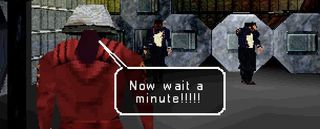Crapshoot: Sentient, the game where every NPC has independent AI, and they all hate you
We're rerunning Richard Cobbett's classic Crapshoot column, in which he rolled the dice and took a chance on obscure games—both good and bad.

From 2010 to 2014 Richard Cobbett wrote Crapshoot, a column about rolling the dice to bring random obscure games back into the light. This week, it's alive! It's alive! Well, virtually speaking.
What made the '90s such a great decade for games? Many things, obviously, but high on the list was that while technology was good enough to leap forwards on a constant basis, there weren't as many rules, established ways of doing things, or games to simply clone. Experimenting with crazy ideas wasn't just for indies or a lucky handful of people who probably didn't smoke anything like as much weird stuff as everyone suggested, because they weren't actually crazy. They were simply different.
And sometimes, as with Sentient, they didn't work out. Still, if you want to see an RPG that shot for the stars, you won't find many more ambitious examples. And if you don't? Well, don't ever let me catch you complaining that the latest mainstream hit is generic. That's officially your fault. Retroactively.
A time machine may or may not be brought in to facilitate this.

Sentient is unlike pretty much other RPG/adventure you've ever played, with its killer feature hinted at by the title—it doesn't just want to create a world, but life. Specifically, where most adventures will just have the characters standing around and waiting for you to grace them with their presence, here they're all kitted out with AI that lets them wander around, do their jobs, follow commands, and even track you down if they have a message.
Elements of that have appeared in other games, like the Virtual Theatre system used in Lure of the Temptress, but this is the only RPG I ever remember playing where the difficulty settings have a slider to set how much of a dick the rest of the crew thinks you are.
Here's a quick clip. Unfortunately of the Playstation version, which actually looks better than the PC one, at least running in DOSBox (which still isn't a fan of 3D acceleration, which might have been supported). This was a dark, topsy-turvy world for the One True Platform, as you can tell.
The biggest gaming news, reviews and hardware deals
Keep up to date with the most important stories and the best deals, as picked by the PC Gamer team.
Plot-wise, the premise is simple. Though like so much of the game, the actual story quickly gets bogged down. You're a medic, newly assigned to a space station about to be swallowed by a sun. If this is a surprise, bear in mind that said station is called "Icarus", making it second-only to the USS Blownupbyklingons in the obvious demise stakes.
You arrive to be greeted not by a welcoming committee, but your shuttle crashing, only to find yourself in the middle of a race against time to save the station, and a mutiny involving the various factions on board. Also, it turns out that there are sentient god particles in the sun and trust me, you do not want to know how silly this gets by the end.

Your main benefit to everyone is that as an outsider, you have no political leanings and haven't been corrupted by anything. Of course, the downside of this is that nobody gives the faintest crap about you most of the time. Go up to someone and try to give them an order, and most of the time they just tell you to go suture your face to your anus and pretend to be a human ringworm. Then they leave before you can give them a quick clarifying biology lesson, because they have better things to do with their time—like stand by a console or go flirt with someone. (If it helps, they don't ever seem to have much luck with this either, if all the bile they keep throwing at each other is anything to go by.)
It should be obvious that Sentient tries to bite off more than it can chew. To get an idea of exactly how much though, imagine the Guinness Burger. It costs $2,000 and weighs almost 200 pounds, with a mound of bacon and enough cheese to turn a mouse lactose intolerant, if they weren't already. Got that? Sentient is a house-fly staring up at it and going, "Lucky I skipped breakfast!"
Sentient has a surprisingly good crack at it though, with AI characters capable of doing relatively complicated actions like leading you to a specific place and then resuming their duties, having conversations with each other, and taking part in real-time events such as gathering for a meeting. True, a lot of the time they flat-out refuse, or simply walk off instead of finishing the conversation, but that's just because they don't like you. In another game, that would be annoying. Here, it's advanced AI! (Kinda.)

Your own interactions with them are equally complex. Instead of dialogue trees or icons, every conversation option is built up from a series of blocks. "WHERE IS... THE CAPTAIN?" for instance, or "FIX... THE COMPUTER". It doesn't take long to work out why this method never took off, but it's an interesting break from the norm while it lasts—and one with a decent amount of flexibility. You can be told to piss off after flirting. You can be told to piss off after giving them an order. It's wide open!
The illusion of life quickly falls apart when anyone opens their mouth though. Sentient has ambitions of being a great sci-fi epic, but its basic writing wouldn't hold up in a junior school creative writing project. It's almost adorable at times, like when you talk to a critically wounded engineer in a rapidly de-pressurising airlock and only get a polite "Right now, I could do with some help," from him. Hand him a medi-kit and, still face down, he politely adds, "I'm indebted to you," before preventing his painful death.
Oh dearie me. And that's before you even get to the names. Oh, the names. There's a medic called "Dr. Luvey", just for starters, not to mention Scrabble scores in human skin like Garrilac and Lollie Downie. But even that is nothing compared to my personal favourite.

Sentient is a seriously tricky game to play, and not a pleasant one. Its environment is one of the dullest ever put into a game—a cramped, dark, claustrophobic place with blocky objects masquerading as interesting stuff, and corridor after corridor mostly impossible to tell apart except for their numbers and colour schemes. It's like being trapped in a particularly cheap Doctor Who episode, or a very expensive Blake's 7 episode.
Characters all seem to have had a nasty encounter with a shovel-wielding psychopath who really hated their faces. Finding the one thing that you actually need to proceed towards one of the multiple endings is about as much of a trawl as you'd expect—especially having to wade though lines like "Wow, you really are young aren't you and come back next week if there's no improvement!"
This isn't exactly the kind of writing you want telling a story like this.

As wonderful as it would be to be able to call Sentient a lost RPG gem, it really isn't. It's not much fun to play, and even its innovative elements are very flawed. It has far more than your average game though, and its core ideas... let's just say I wouldn't object to seeing them in a few more games.
To get a better feel for it, here's a handy Let's Play—again of the Playstation version, but the two are essentially identical as far as the clever stuff goes. One day, maybe AI driven stories and real-time adventures will be the norm, and something like this will no longer seem special. Glancing at the games on the shelves right now though, it's going to be a long way off. And y'know, that really seems a little sad.
* DISCLAIMER: Sentient is not actually sentient. At least I hope not. I'd hate to think it felt pain as I deleted it from my hard drive, and prefer to assume that the screams coming from my tower case were merely the weeping death-knells of the little elves responsible for channelling electricity around the place through their assorted appendages. For whom I feel exactly nothing. And never, ever will.
Most Popular

